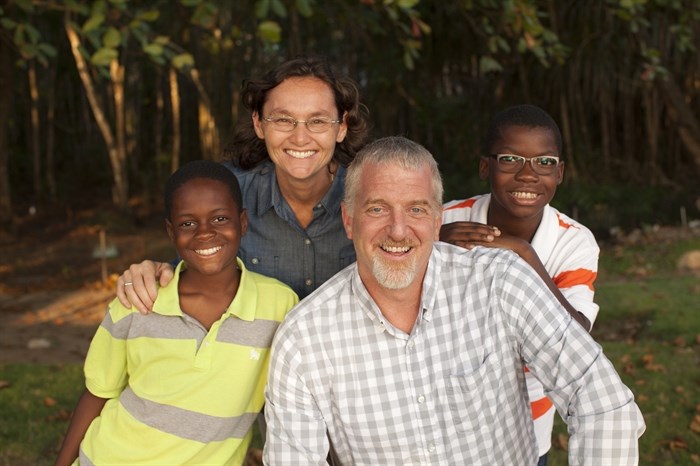
Bev and Kendell Kauffeldt with their children.
Image Credit: Contributed
February 06, 2015 - 7:39 PM
RAISED IN SALMON ARM, NOW FIGHTING EBOLA IN LIBERIA
LIBERIA - Working in the Ebola treatment unit, Bev Kauffeldt would hold her hands together in front of her to resist the urge to console patients with a shoulder squeeze, or a hug. On occasion, if she dipped her three layers of gloves into chlorine, she could touch a person. Right after though, she would have to disinfect.
Kauffeldt, 43, has been working for a Christian organization called Samaritan’s Purse for 16 years, but nothing prepared her for what she has seen and done during the Ebola outbreak. The daughter of North Okanagan Shuswap MP Colin Mayes grew up in Salmon Arm but spent the last ten years living and working in Liberia with her husband and sons, aged 11 and 12.
The family was evacuated in late July, but Kauffeldt and her husband have both made return trips to aid in the Samaritan’s Purse Ebola Task Force efforts. She went back for six weeks in the fall to help coordinate the organization’s educational initiatives, which bring outreach to communities on basic health, sanitation, Ebola symptoms, and how to use protection kits. Because many residents do not know how to read or write, posters that illustrate what Ebola symptoms look like are posted in the communities.
Kauffeldt got used to having her temperature taken twice a day and pinned to her shirt so everyone could see it. She took malaria pills, as well as Zinc and Vitamin C, daily to keep her immune system up and reduce the risk of getting sick. And while her most recent trip back to Liberia was spent organizing teams primarily from an office, back in June and July, she was working on the front lines of the outbreak.
She was on the hygiene team, working directly inside the ebola treatment unit. Before entering, she and her co-workers double and quadruple checked each other for breaches — tears or rips — in their protective gear. The treatment units were made of tarps, lumber and nails — lots of sharp objects to potentially catch a sleeve or a glove on. Kauffeldt’s job was to remove waste and liquid matter, as well as bodies.
“That was one of our main tasks after the doctors declared someone had succumbed to Ebola,” Kauffeldt says, adding the disease is at its most virulent after a person dies. “It was a job that had to be done, and it had to be done safely.”
Worse than anything was seeing children lose their parents to the disease.
“You can’t touch them or console them. You can just keeping talking to them, maybe bring them some candy,” Kauffeldt says.
“You see a lot of suffering in the work that we do. You learn to prepare yourself spiritually, mentally, emotionally,” she says. “I don’t think anything anyone did ever prepared us for the enormity of this outbreak.”
It was exhausting work — both physically and mentally. The temperature inside the protective suits could get up to 40 C, plus 90 per cent humidity. Days were long, sometimes 16 hours. The work never stopped.
“You can get very fatigued. Mentally you have to focus intently not to make mistakes. You feel claustrophobic (in the suits), but you have to stay sharp,” she says.
Faith and prayer helped her through the worst of what she saw. That, and the desire to “give people some sort of hope and dignity throughout the disease.”
Panic and fear spread through North America on the heels of the disease, but Kauffeldt hopes to see a different emotion at the forefront.
“We face a lot of stigma to a certain extent. Even though I was sitting in an office, people say ‘You were in Liberia, I don’t want to get near you,’” she says. “There has to be some understanding that the more we’re aware of it and the more we can help there, the safer it is for all of us. We have to have compassion for these countries that are already poor, that have been devastated now by disease. I would hope people understand that before worrying about their own welfare in a very comfortable North American setting.”
Kauffeldt and her husband hope to return home as soon as the situation stabilizes. Liberia has been their home for ten years and they’re all anxious to get back, not only to their house, but to the many friends they have made there.
To contact the reporter for this story, email Charlotte Helston at chelston@infonews.ca or call 250-309-5230. To contact the editor, email mjones@infonews.ca or call 250-718-2724.
News from © iNFOnews, 2015